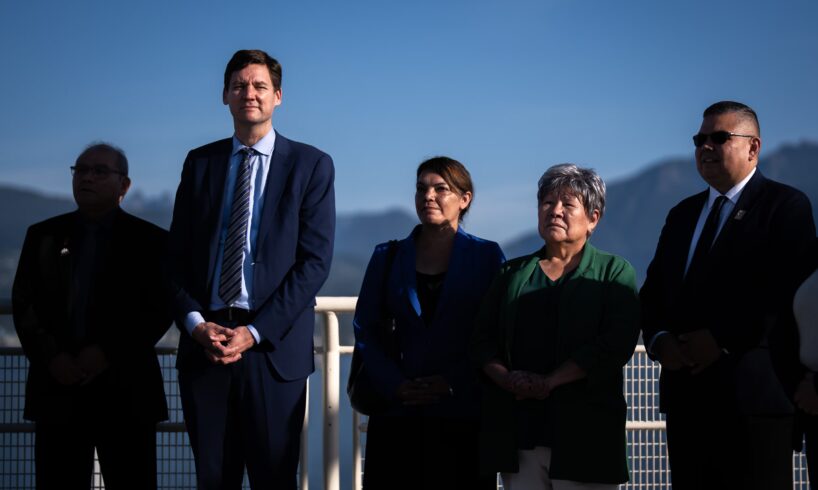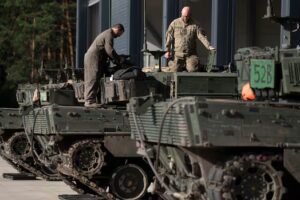
Open this photo in gallery:
B.C. Premier David Eby, second from left, stands with Nisga’a Nation President, Eva Clayton, second from right, during a Ksi Lisims LNG announcement of an environmental assessment certificate from the B.C. government on Sept. 16 in Vancouver.ETHAN CAIRNS/The Canadian Press
British Columbia Premier David Eby, facing criticism for his massive deficit spending, offered a road map this week that lays out how his province will find its way out of a fiscal bog.
Through legislation tabled Monday, the province’s Crown corporation, BC Hydro, will build a new transmission line for northwestern B.C. that is expected to secure up to 14 major private-sector investments including mines, liquefied natural gas plants and an expansion of the Port of Prince Rupert.
This is the NDP’s debt management plan: Mr. Eby says B.C. can be the economic engine for Canada as the nation pivots away from the United States as its primary trading partner.
But critics question whether the ambitious plan will be able to rescue a fiscal situation deteriorating more rapidly than new revenues are likely to roll in.
Reality check: The first ‘major projects’ for fast-tracking are already on the fast track
“Our fiscal position is concerning, but the trajectory is alarming. The speed at which our finances have unravelled is quite extraordinary,” said David Williams, vice-president of policy for the Business Council of B.C.
Since Mr. Eby became Premier in 2022, the government’s balance sheets have swung from surplus to record-breaking deficits. He has been under fire from the opposition Conservatives and from the business community for a spending spree that far outpaces the province’s revenues.
The province has posted back-to-back record deficits, while the total provincial debt is growing quickly. The debt was a little more than $83-billion when Mr. Eby became Premier, and is set to rise to almost $213-billion in three years’ time.
In September, the first-quarter fiscal update showed that this year’s deficit is heading even higher than planned, to $11.6-billion.
In response, Mr. Eby promised only modest spending cuts. “I know that British Columbians saw our Q1 results and recognized the need for us to reduce government costs. But that alone will not be sufficient. We also have to grow our economy.”
The B.C. economy was outperforming other Canadian jurisdictions for years, thanks to four megaprojects: the Transmountain oil pipeline, the Coastal GasLink natural gas pipeline, the Site C dam and LNG Canada. When construction work wrapped up, revenues declined but government spending did not.
However, there are major projects getting under way now. As well, Ottawa has committed to fast-tracking what it calls “nation-building” major projects and the province has submitted a list of 18 potential developments for consideration.
The province has approved the $1-billion Roberts Bank Terminal 2 at the Port of Vancouver, which is now going into a bidding process. Construction started in August for the $2.4-billion Highland Valley Copper mine life-extension project, billed as the largest critical-minerals investment in B.C. history.
The Eby government has also given a green light to the Ksi Lisims LNG and Cedar LNG facilities, the Tilbury Marine Jetty on the Fraser River for the supply LNG bunkering vessels, and eight other new or expanded mines.
A polite ‘no’: B.C. Premier Eby seeks to avoid a battle over Alberta’s pipeline ambitions
And while Mr. Eby can’t take credit for the recently completed $18-billion export terminal for LNG Canada, he was there to cut the ribbon and is pushing hard to get Phase 2 built.
BC Hydro plays a pivotal role in the Premier’s plan for prosperity. Bill 31, known as the Energy Statutes Amendment Act, directs the utility to build the first stage of the North Coast Transmission Line, or NCTL, at a projected cost of $6-billion. Additional spurs could double the final cost.
Speaking to reporters, Mr. Eby confidently offered an economic benefits summary that will flow from the 14 projects that the NCTL is designed for: The B.C. economy will grow by $9.85-billion annually, with about $1-billion in revenue to government. The projects will create 9,700 direct jobs a year on average. And, the clean electricity provided by the NCTL will cut two to three million tonnes of CO2 annually from those new industries.
Although the numbers sound precise, they are anything but solid. There is no guarantee that any of those private-sector projects will be completed. Those that are built won’t likely come into operation for many years: The first stage of the transmission line is set to be finished in 2032.
The new projects that B.C. wants to secure through the new transmission line may be years away from final investment decisions, Mr. Williams of the Business Council of B.C. noted. “They haven’t reached FID yet, so we don’t know if they’re going to go ahead, even if they did, it would take some time.”
Adrian Dix, B.C.’s Energy Minister, could not say when new projects will be secured.
“We’re going to see the benefits once the line is built, once final investment decisions are made on those mining projects,” he said.
Mr. Eby has been laying the foundation for this plan with a string of concessions to industry. Over the past three years, the mining sector and other resource-extraction industries have enjoyed carbon-tax cuts and reduced royalty payments, electricity rebates and relief from emissions-reduction targets. The province has cut red tape and has committed to prioritizing those sectors for new electricity supply.
Michael Goehring, president of the Mining Association of BC, this week applauded the government’s commitment to the NCTL, saying it is a safe bet to secure tens of billions of dollars in critical-mineral mines in B.C.’s “golden triangle” of rich mineral deposits in the northwest corner of the province.
Enbridge CEO urges Ottawa to remove barriers to building energy infrastructure
“We’re pleased with the focus this government has placed on critical minerals,” he said in an interview.
“But the number one barrier holding back British Columbia’s mining sector is permitting delays. While the province has committed to improve permitting timelines, more urgency is needed.”
Environmentalists are calling into question the economics of B.C.’s push to fast-tracking mining and the fossil-fuel industry, an agenda which they say comes at the expense of climate change.
Sven Biggs, Stand.earth’s director for Canadian oil and gas programs, says the payoff from expanding LNG isn’t worth the cost to the environment from fracking for natural gas.
“LNG in British Columbia is more expensive than other producers like Qatar or the U.S. Gulf Coast, so the only way these projects move forward is with public subsidy. We’re going to have to help this industry get up and running, and that will eat up almost all of that new revenue created,” Mr. Biggs said.
Mr. Eby responded to his critics this week: “It’s not that I love natural gas, it’s that I love jobs for British Columbians. I love prosperity for our province.”





